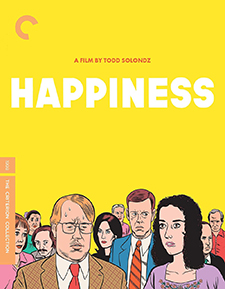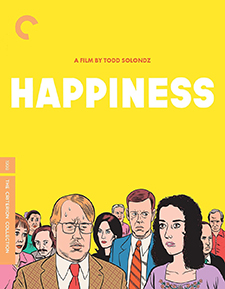Happiness (Blu-ray Review)

Director
Todd SolondzRelease Date(s)
1998 (September 24, 2024)Studio(s)
Killer Films/Good Machine Releasing (The Criterion Collection – Spine #1235)- Film/Program Grade: A-
- Video Grade: A
- Audio Grade: A
- Extras Grade: B
Review
Happiness, directed by Todd Solondz following his success with Welcome to the Dollhouse, traces the sometimes intersecting lives of people whose self-defeating personalities doom their individual quests for contentment. Just as Welcome to the Dollhouse depicted life in junior high school as a daily nightmare, Happiness draws the lives of its New York City-area adults as lonely, dissatisfied, frustrated, fearful, and self-defeating in their individual quests for human connection. Most of them cloak themselves in benign facades to conceal their dark impulses.
The major connection among the characters is a family of three sisters—Joy, Trish, and Helen. Joy (Jane Adams, Songcatcher) is a would-be musician who can’t get her life together and still lives with her parents in New Jersey. Trish (Cynthia Stevenson, Home for the Holidays) is a well-to-do suburban housewife and mother who declares, without irony, that she “has it all.” Helen (Lara Flynn Boyle, The Road to Wellville) is a poet and recent best-selling author who projects a steely coolness but she’s fraught with insecurity and doubt about her artistic ability. Their parents are none too stable, either.
The opening scene shows an awkward dinner date break-up between gentle Joy and her sad-sack boyfriend (Jon Lovitz, The Producers). Her taste in men only deteriorates when she becomes involved with Vlad (Jared Harris, Lincoln), a student in her citizenship class.
Trish is married to Dr. Bill Maplewood (Dylan Baker, Selma), a psychiatrist with a bland, white-bread sort of face who seems well-meaning but he’s secretly a pedophile preying on friends of his pre-adolescent son, Billy (Rufus Read, Double Parked), who himself is trying to make his way through the confusions and obstacles of middle school.
Helen is oblivious to the fact that she’s lusted after by her neighbor Allen (Philip Seymour Hoffman, Moneyball), whose sexual outlet is making anonymous obscene phone calls. Another neighbor, the pathologically overeating, overweight Kristina (Camryn Manheim, Twisted), is attracted to Allen and stops by his apartment periodically to report news about their doorman’s brutal death. The sisters’ parents, Lenny (Ben Gazzara, Summer of Sam) and Mona (Louise Lasser, Bananas) are in turmoil because Lenny simply doesn’t want to live with Mona anymore.
Balancing such a large group of characters with individual stories would be a challenge for any director, but in Happiness director Solondz is also dealing with the hidden darkness of people who, on the outside, are normal, and even mundane. There’s a sense of voyeurism, fascinated and often appalled, as we peek into their lives. Rather than outliers, they’re very much integral to society, leading us to wonder how many people live behind carefully created veneers that conceal unpleasant, sad, and vile motivations.
Solondz’s straightforward approach to these seemingly taboo stories gives the film enormous heft. His characters are presented matter-of-factly, without fanfare, without embellishment. They’re real, flawed individuals wishing for happiness and often thwarting their own efforts to seek it.
The performances overall are excellent but the standouts are Baker and Hoffman. As the closeted pedophile, Baker’s Bill is terrifying in his blandness. Family man, attentive father, respected member of the community, Bill nonetheless harbors desires he cannot or will not control. The lengths to which he goes in order to sexually abuse his son’s sleepover guest are extraordinary and smack of a Hitchcock villain’s machinations. Soft spoken, sympathetic to his son’s insecurities, and devoted to his family, he conveys a decidedly creepy vibe as we learn about his secret life.
In one of his early screen roles, Hoffman is amazing as the deeply troubled Allen, whose self-loathing and inability to seek out a normal relationship have led him to drink excessively and make obscene phone calls to satisfy himself sexually. His rare interchanges with other humans are strained and sadly awkward, as if he lacks the tools of normal human interaction.
Adams’ character is painted as such a loser that her scenes are often comic, probably intentionally. Her Joy clearly wants a better life but, like Allen, isn’t properly hardwired to achieve it. In contrast with Allen, however, she perseveres with music and with men despite repeated failures. Life seems to beat her down over and over. Her sisters’ worried conversations about her carry an aroma of superiority.
Helen is the least developed character. She affects world-weariness and boredom with her whirlwind professional and social life but, at home alone, broods endlessly about not being worthy of the reputation she has attained as an author. Her “troubled artist” character has been seen before and is the one that leans most heavily toward cliche. Helen’s stony face and cold eyes make her unsympathetic, and it’s not easy to warm to her or her concerns.
The underlying mood is one of sadness for these people but Solondz keeps the film from being totally depressing by including some lighter moments. These are not jokey moments. They derive from the characters’ social discomfort, nervousness, uneasiness and secretiveness. These people might be your next-door neighbors or co-workers—seemingly normal, average individuals who blend into your daily life by projecting false images to mask their desperate, despondent lives.
Happiness was shot by director of photography Maryse Alberti on 35 mm film with Panavision cameras and lenses, and presented in the aspect ratio of 1.85:1. According to information in the enclosed booklet, “this new 4K restoration was created from the 35 mm original camera negative,” and was supervised by Maryse Alberti. The restoration looks fantastic. Details are sharp, with superb contrast and clarity. Details such as perspiration on Allen’s face, details of the Maplewoods’ kitchen, wrinkles on Louise Lasser’s face, decor in a restaurant, and patterns on clothing are well-delineated. Lighting is natural for the most part, with only the final scene, set in Florida, bright and sunny. The color palette varies and tends toward darker hues in the scenes between Bill and son Billy. The Maplewoods’ kitchen is bright and cheery, with a TV sitcom look that suggests this is a room in the home of a typical American family. Director Solondz uses close-ups only of Kristina, as she peers through Allen’s partially open door, to suggest her interest in him and his reluctance to open up to her emotionally.
The soundtrack is English 2.0 DTS-HD Master Audio. English SDH subtitles are an available option. Dialogue is clear and distinct. Allen speaks with hesitant pauses and downcast eyes. Bill and Billy speak quietly and thoughtfully in private. Lenny speaks confidently and directly, not sparing wife Mona from his hurtful words. Kristina, eyes wide open, speaks with fascination about the death of the doorman. In the first scene, set in a restaurant, ambient noise is heard as Joy and her date have a strained conversation.
Bonus materials on the Region A Blu-ray release from The Criterion Collection include the following:
- Conversation Between Director Todd Solondz and Filmmaker Charlotte Wells (40:49)
- New Interview with Actor Dylan Baker (13:52)
- Theatrical Trailer (2:03)
Conversation with Director Todd Solondz – Solondz is interviewed by his former film student, Charlotte Wells. They talk about the challenges of independent filmmaking. Solondz was happy with his first success, Welcome to the Dollhouse, and knew he had to take advantage of opportunities it would provide that might never be there again. Fox contacted him and pitched the idea of turning Dollhouse into a TV sitcom. He wasn’t averse to the idea, but the project never came to fruition. In Happiness, he had to make the scenes identifiable yet often “fraught with ambiguity.” Clips from Happiness are shown as Solondz discusses certain aspects of the picture. The director confesses that he’s never made a film that ends on time and on budget. He’s not thrilled with the process of shooting the film but he loves casting. The studio encouraged him to hire movie stars but no one wanted to play the pedophile role of Bill Maplewood. On the other hand, every actor was eager to play the role of Allen. “You have to see the big picture” of making a film. Solondz is less stressed now when making movies than he was with his earlier films. The reaction to Happiness from a general audience was mixed. He enjoyed hearing feedback and different opinions. He’s gratified when people are moved by his film. The experience of the movie, he notes, is ultimately what matters.
Interview with Dylan Baker – Baker was shocked by the Happiness script, which he considered the best he’d ever read. When he asked director Todd Solondz why he cast him, Solondz honestly told him that the role was turned down by every A and B-list actor to whom it was offered. Baker was fascinated by the dark character of Bill Maplewood. The director didn’t want Baker to speak with a real pedophile because the character has not yet been found out and disciplined. Baker read books about behavioral obsession. Bill considers himself a great family man and keeps his dark side private. With a character that has a dark side, you have to show humanity. Audiences either loved or hated the film but all were shocked by it.
Booklet – The enclosed accordion-style booklet contains the essay Love & Mercy by Bruce Wagner, cast and key crew list, six color photos of cast members, and details about the film’s restoration process.
Happiness is also available in a 2-Disc Combo Pack edition. One disc contains the 4K Ultra HD version of the film in Dolby Vision HDR and a Blu-ray containing the film and special features.
Happiness isn’t always comfortable to watch because it shows how people can be responsible for the pain of others. The film’s depiction of unhappy, unfulfilled individuals is an unfiltered look at how an assortment of human beings long for simple contentment and attempt to achieve it in often antisocial and even criminal ways. Rather than judge its characters or apologize for them, the film presents them honestly, giving the viewer insight into their souls.
- Dennis Seuling

